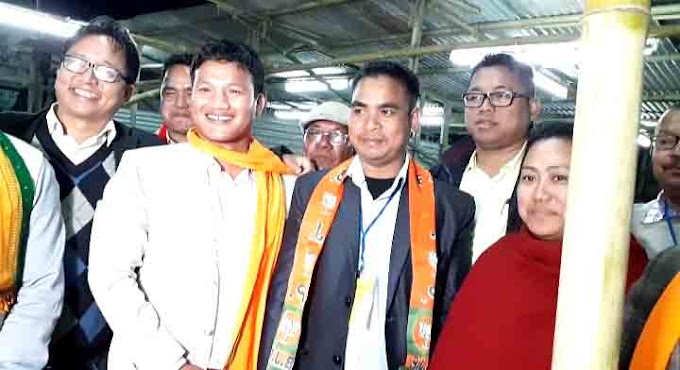HAFLONG, May 13:- Officials from National Institute of Public Finance and Policy under Union Ministry of Finance held meeting with North Cachar Hills Autonomous council, on May 13 in the conference hall of the Council, presided over by EM & CEM incharge Athong Lenthang; wherein, NIPFP team held a significant interaction with the Executive Members and officials of the Council with a view to conduct a study on state finances and recommend perspective plan along with structural and institutional reforms in public finance.
Participating in the meeting through video conference from Guwahati, the Chief Executive Member Debojeet Thaosen, stated that full autonomy should be given to the NCHAC in terms of policy making and financial plan making. He also put forward the necessity of Council’s participation in budget preparation and said that for the annual budget planning the council may preferably have the autonomy to demarcate allocation of budget to departments on need base.

The president of the meeting Athong Lenthang impressed upon the necessity of direct funding of the Central Government to the Council on need based and to alternate the 70:30 ratio of funding to the North Cachar Hills Autonomous Council and Karbi Anglong Autonomous Council, considering the reality topographic as well as communication divergence of Dima Hasao district. For this, Mr. Lenthang informed the team about the backwardness of the district, such as almost all communication problems rail and road communication problem, telephonic and mobile - internet communication problem; besides, the topographic situation. All these problems, he mourned, make the district in price of all commodities, travelling fare, etc. that when potato is Rs. 10 p/kg in Diphu, it is Rs. 20 in Haflong and all the like. As such, in Lenthang’s opinion, the true and only hill district in Assam can be said is this Dima Hasao district. Hence, he said that distributing fund between the NCHAC and KAAC based on population cannot justified, instead it should be need base, as felt by the Chief Executive Member Debojeet Thaosen.
Representing the normal sector of the Council the Principal Secretary Mukut Kemprai presented the revenue challenges of the council, showing the necessity of permanent solution to the financial shortage, especially employees’ salary which is paid from the Govt grant in aid. Thie same was seconded by the Principal Secretary (Transfer) on the points put forwarded by the former.
EM Kulendra Daulaguphu, citing the history and background of the NCHAC, spoke on the ground reality which hampers lot of development projects vis a vis budget allocation to the two hill districts of the state on basis of population. The inequitable share of fund allocation between Dima Hasao and Karbi Anglong has to be revisited and revitalized.
Another Executive Member Nirmal Langthasa, contestant of the just concluded MLA election, placed the problems of procedures involved in the flow of fund from the centre to council which has adversely affect in completion of works on time due to escalation of price and penalty clauses involved.
EM Mihir Gorlosa, speaking on the occasion, advocated for the mineral development policy which is a very important source of revenue for the district. He suggested that the natural resources which are inadvertently on agreement with the state govt deprives the district of its rightful share which may in many ways be a solutions of the council specially regarding shortage of fund.
Elaborating all points of discussions in the meeting CEM incharge, Athong Lenthang stressed on direct release of development funds from centre to the district so that this Autonomous Council may function in true sense of autonomy.
A three member team from NIPFP comprised of Dr. Pinaki Chakraborty, Manish Gupta and Bismai Basu. The National Institute of Public Finance and Policy (NIPFP) is an autonomous research institute under India’s Ministry of Finance. It acts as a centre for applied research in sustainable public finance policy for development, advocacy and capacity development. Based in New Delhi, India, the centre conducts research on public finance and contributes to the process of policy-making relating to public finance. The team will study the pattern of expenditure and suggest measures for public expenditure reforms as well as make evaluation and targeting of subsidies by the State.
Others present were Sr. FAO S Taron, Jt Secy L Z Nampui, seceratries of the council and other senior officials.
Significantly, this is the first time such initiative from an important finance body under the Ministry of Finance has been sent to this district to make research and prepare report which could be a landmark for way out from all adversity and financial crunches the NCHAC has been facing.
The participation of the CEM through video conference from Guwahati, which she says, is another laudable milestone for the council experiencing such technology from the conference hall for the first time),






0 Comments